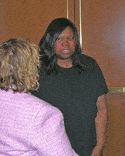A New Generation of Worship for a New Generation of Americans

It was an information-packed morning in the assembly hall. The Rev. Karen Ward, Vicar and Abbess of Church of the Apostles, a young, emerging, Episcopal and Lutheran mission congregation located in Seattle, delivered the keynote address in two parts. The first part was the more factual and informational part of Pr. Ward’s time with the assembly, whereas worship on Friday night was the experiential part of her offerings to the assembly. This worship was modeled on the type of worship that is done in her congregation (see earlier blog entry on this service).
The first part of Pr. Ward’s presentation was focused on providing background on Millennials, the age group that Church of the Apostles targets.
In speaking to the Metropolitan Washington, D.C., Synod, Pr. Ward said that the synod may want to reconsider its “Year of the Young Adult” as a year-long emphasis as she believes that the church needs a long longer-term view.
Facts she provided on this generation:
- The Millennial generation is largest, bigger than the Baby Boom – 90 million strong
- Most are in their 20s
- It is the most racially tolerant and open generation
- The majority are politically progressive
- It is the most highly educated generation
- It is peer-oriented and relational
- Members are “wired different”
- Members are civic-minded and environmentally committed
- Members are trying to make it in the toughest economy since the Great Depression

She showed a video about new trends in culture and the exponential pace of change in technology, global demographics, education, jobs, etc. Pr. Ward noted that the Millennial Generation is right in the heart of these changes – the fast-changing pace of reality and so much information
During a brief question and answer session, Pr. Ward spoke of ways that her congregation has allowed people to escape technology, which this generation has grown up with and become attached to – not to allow it to lord over them.
In the second part of her address, Pr. Ward spoke more about her congregation and shared her experiences in developing it.
Features of Church of the Apostles:
- Median age of her congregation is 26 years; 150 members
- Run by young adults
- Worship is not segmented into categories or labeled this way (traditional, modern, etc.) — “We describe our worship as Word and Sacrament. We have services about Jesus Christ.”
- Has moved from a house church to a storefront to an old Lutheran church building (now called the Fremont Abbey – Fremont is the neighborhood of Seattle where the church is located); the word “church” presents a negative view of a community
- “We focus on the big questions of life.” – God, self, community, world (Where is my place in all of these? Who am I, and do I matter? What is community, and does community matter? How can this be marshaled to engage the problems of the world?)
- Uses music a lot to communicate
- Construct their own (large) icons, used in “open space”
- Inspired a lot by monasticism – a new mysticism in the age of the Internet/technology, an interconnectivity; with talk about spirituality, people listen
- People are baptized into the “order of Jesus Christ”
- Has a “community rule” with tenets: love God and love neighbors; give invitations and provide welcome; engage community and practice faith; share stories and throw parties; create are and exchange gifts; renew culture and steward creation
- Runs an art center, created as a nonprofit; pays for the mortgage of the church, etc.
- Has a set of spiritual practices (hospitality, worship, prayer, scripture, reflection, tithing, confession, forgiveness, fasting, feasting, discernment, pilgrimage, Sabbath, retreat); Example: When someone has a life question (career, for example), a few people are gotten together in a group for a “discernment group”
- Has virtues: generosity, graciousness, thankfulness, humility, accountability, compassion, transformation, obedience, courage, faith, hope, love
- Trying to form an “Our Space” church: In the Trinity is “room for us”
What is emerging worship? Pr. Ward offered some definitions she and others have developed. These definitions touched on drawing from ancient practices of the Christian faith and using resources from today’s culture and formats and current musical forms.
Following the second part of her presentation, which was cut short because of time, Pr. Ward led a workshop over lunch. The room was packed, with people spilling out into the hallway.



